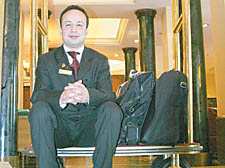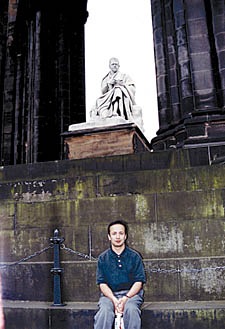
Iqbal Ahmed at work at the Marriott Hotel in Swiss Cottage

At the Scott Monument in Edinburgh on his travels |
Iqbal's travels: A dream of England shattered
By night Iqbal Ahmed is a hotel doorman, by day he
writes books considered the
best of the year by the Guardian.
Dan Carrier finds out how he does it
Empire of the Mind: A Journey Through Great Britain by
Iqbal Ahmed, Coldstream Publishers, £9.95 order this book
AN Imperial hangover is still with us: but its effects are only
noticeable if you know where to look. For Hampstead-based hotel
concierge turned author Iqbal Ahmed, whose second book Empire
of the Mind is out this week, Britain’s past, when two-thirds
of the world where painted pink, is still apparent.
Iqbal works nights at the Swiss Cottage Marriot hotel and uses
it fund his writing. His first book Sorrows of the Moon, which
was about moving to London from his native Kashmir, was named
as a book of the year by the Guardian.
“My shift starts at 3pm and ends late that night,”
he says. “This gives me time during the day to research
and write.”
And Iqbal does not coop himself up at his home in South End
Green to write – he takes his laptop into cafés
in Camden Town to soak up the city’s atmosphere.
He moved to London from Kashmir 12 years ago, was inspired to
create a chronicle of an immigrant’s experience of being
a stranger in a new land. It was well received: Ahmed’s
writing style is straightforward and to the point.
English is Iqbal’s second language and his family, although
great storytellers, were illiterate – his nephew has had
to read his first book to his mother.
His prose style is clear and easy to read and his travel writing
avoids Wordsworthian descriptions which show off the vocabulary
of the writer.
A fan of English literature, he was inspired to come to London
after reading an Oxford English Dictionary that an uncle bought
for him in Srinagar, the capital of Indian Kashmir.
He says “English language books are sought after in Kashmir
and I read all I could lay my hands on. It meant the British
Library became a mythical place, the centre of my world.
“At first my travelling was random – I thought I would
look at places that had a literary connection: Stratford-Upon-Avon,
Oxford, Cambridge and Hay-on-Wye.”
But then, as he met others who had come from abroad to live
in London and then moved out of the capital, he decided to widen
his remit.
On his travels Iqbal achieved two different things. First he
produces a snapshot of today. The multicultural layers of the
UK are stripped bare. He mixes with other immigrants, telling
their story in occasionally tragic tones. The second aspect
that leaps out is his liberal use of factual information, which,
it appears, he feels the reader should know. At times it is
almost as if the narrator has swallowed a list of facts.
At times, you wonder if the book has an element of the spoof
about it: then you pinch yourself and remember you are in conversation
with Iqbal.
Stopping in Hereford on his way to Hay-On-Wye, Iqbal tells us: “I saw nothing noteworthy,” a fact he feels worth
noting.
But this strange way of telling the reader nothing happened,
and his deadpan way of reciting the sort of facts you find in
municipally-produced tourists leaflets, is
strangely mesmerising.
Other vignettes include Iqbal marvelling at the nuances of the
language he has adopted. He writes that a lady from Edinburgh
was polite when he met her, prompting him to think of all Scottish
people of being as nice. “I always found her soft tone
and turn of phrase delightful,” he writes. “One day
she told me how the phrase ‘daylight robbery’ had
come into use because of a tax on windows.”
And during his travels he meets people who, like him, have come
to the mother country. As a hotel worker, he knows how to recognise
a transient population: we meet Peter, the South African who
worked with him at his hotel but moved to Edinburgh to escape
his friends who sat around all day eating the food he would
buy and drinking the wages he’d lend them in the pub at
night.
But above all, this is a story about the decline of empire and
the creation of a modern, multi-cultural country.
Iqbal says: “My early visions of Britain at my home in
Kashmir were heavily linked with products like Horlicks, the
produce of an imperial past that had made themselves at home
in India.
“I had mistakenly believed the British empire to be benevolent
and I couldn’t see the point of wailing about colonialism
half a century after its demise.”
Sadly, Ahmed’s vision of the England he expected to find
when he first moved to London has changed. He says: “I
arrived with an American travel-guide notion of it being genuinely
most civilised country in the world. Then I discovered that
Britain has one of the worlds largest prison populations – not a sign of a civilised country. It was like catching a glimpse
of the dark side of the moon. I had also mistakenly believed
that if there was a socialist country anywhere in the world
it was Britain. But I saw as much social inequality here as
elsewhere.
“The London I had heard about in my childhood in Kashmir
was a city where people were compassionate, shopkeepers were
honest and democracy was valued.
“In London I found to my dismay that only half of the electorate
bother to vote. It seemed absurd that Britain was waging war
in the 21st century on the pretext of bringing democracy to
another country when only half of its own people wished to exercise
their right to vote.”
Iqbal’s book is not just a well-told piece of travel writing,
but an interesting insight to the country that is often taken
for granted by the people who live there.
|



